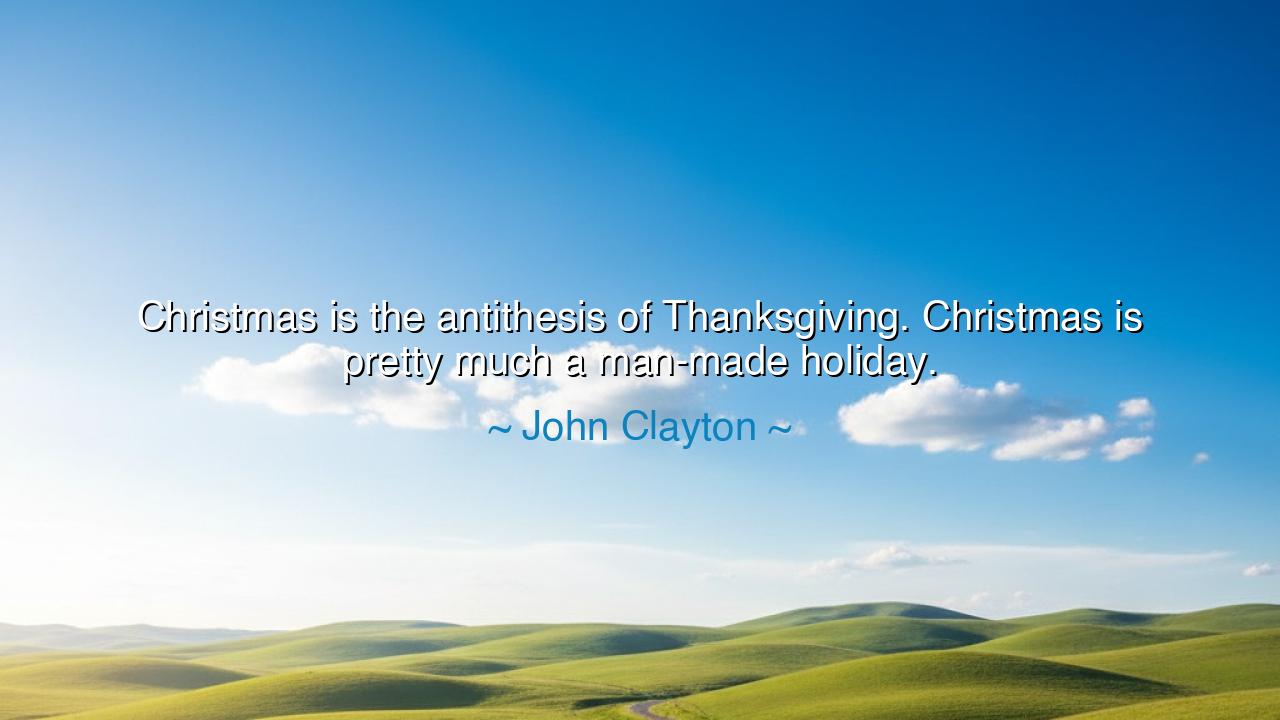
Christmas is the antithesis of Thanksgiving. Christmas is pretty
Christmas is the antithesis of Thanksgiving. Christmas is pretty much a man-made holiday.






John Clayton once declared with candor: “Christmas is the antithesis of Thanksgiving. Christmas is pretty much a man-made holiday.” In this sharp reflection, he draws a line between two of the most celebrated feasts of the American calendar. On one side stands Thanksgiving, rooted in gratitude, simplicity, and the harvest. On the other side stands Christmas, laden with gifts, commerce, and elaborate invention. His words are not meant to dismiss joy, but to awaken us to the contrast: one holiday rising from the soil of necessity and gratitude, the other shaped by tradition, ritual, and man’s own hand.
The origin of this thought lies in the histories of the two days. Thanksgiving was first proclaimed as a day of gratitude by President Lincoln in 1863, during the darkness of the Civil War. It was meant to call people back to the essentials of survival, to recognize providence, and to humble the nation before God. Its very soul is gratitude for life’s basics—food, family, and survival. Christmas, by contrast, though tied to the birth of Christ, developed as a mixture of religious observance and human traditions—decorations, feasts, trees, and, in the modern age, the engine of commerce. Thus Clayton calls it “man-made,” not in scorn of faith, but as acknowledgment that much of its form is shaped by culture and consumption.
History offers examples of this distinction. The Puritans who first celebrated Thanksgiving resisted the old-world traditions of Christmas, which they saw as overly ornate, pagan in origin, and driven by revelry rather than reverence. For them, a day of thanksgiving was pure, untainted by worldly additions. Centuries later, even as Christmas grew into a day of universal festivity, some continued to note that its trappings—gifts, lights, and markets—were largely shaped by men and merchants, rather than divine command. Thanksgiving, by contrast, retained the aura of simplicity and humility.
But Clayton’s words also cut deeper, into the human heart. For Christmas, in its modern form, often tempts us into excess—into measuring love by the cost of gifts, into exhausting ourselves with spectacle, into forgetting the essence beneath the ornaments. Thanksgiving, in its simplicity, calls us to remember what sustains life: bread, companionship, gratitude. Thus, to call the two “antitheses” is to remind us that one celebrates having enough, while the other too often magnifies desire for more.
Yet, his observation should not be taken as condemnation, but as warning. Even a “man-made” holiday can carry profound meaning when celebrated with intention. Christmas can be a time of generosity, of family unity, of reverence for the birth of hope. The danger lies not in the day itself, but in how it is practiced. Thanksgiving teaches us the posture of gratitude, and that posture should be carried into Christmas as an antidote to materialism. When gratitude fills Christmas, the two holidays cease to be opposites and instead become companions.
The lesson for future generations is this: guard the spirit of your holidays. Do not allow them to be swallowed by commerce or spectacle. Remember that gratitude and simplicity are the roots of true joy, whether in November or December. Celebrate traditions, but let them never obscure the heart of what is holy: family, kindness, and the remembrance of blessings.
Practical wisdom flows from this. When Christmas approaches, pause to ask: Am I celebrating with gratitude, or only with consumption? Bring the humility of Thanksgiving to your Christmas table. Choose presence over presents, compassion over extravagance, simplicity over excess. Teach your children that the value of a holiday lies not in what is bought, but in what is remembered, shared, and given from the heart.
Thus, John Clayton’s words stand as a reminder for the ages. Thanksgiving calls us back to the earth, to gratitude, to the things no man can manufacture. Christmas, in its modern form, is indeed shaped by men, but it can be redeemed by gratitude and love. Let us keep the balance: to rejoice without forgetting, to give without excess, to celebrate without losing sight of the sacred. For in this balance lies the true spirit of the holidays.






AAdministratorAdministrator
Welcome, honored guests. Please leave a comment, we will respond soon